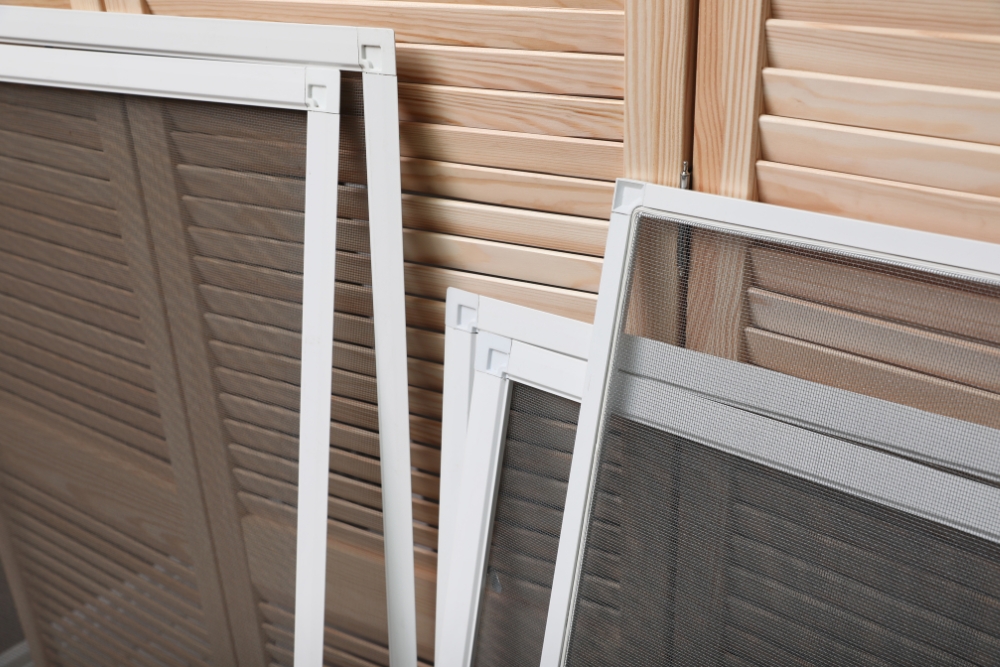Struggling with allergies at home or in the office? You’re not alone! We know how frustrating it can be to deal with sneezing, itchy eyes, and other allergy symptoms. Did you know that indoor air can be more polluted than outdoor air? But don’t worry – we’ve got the solution for you! In this article, we’ll explore how window screens can help control allergens and improve your indoor air quality. Ready to breathe easier? Let’s dive in!
Key Takeaways
- Window-mounted pollen screens can filter out allergens like dust and pollen, making the air in your home or office cleaner and reducing allergy symptoms.
- Installing allergen-resistant shutters is a smart move to repel dust and other particles, helping you breathe easier while also adding a stylish element to your space.
- For those with allergies, hypoallergenic curtains are an excellent investment as they trap harmful particles and can be easily washed to maintain a healthy indoor environment.
- Cellular shades not only block allergens but also insulate homes against outdoor pollutants, offering both health benefits and energy efficiency.
- By sticking dust-resistant window film onto your windows, you create another layer of protection that prevents irritants from coming inside without blocking natural light.
The importance of allergen control in maintaining a healthy home
We all want our homes to be safe havens, free from the sneezes and sniffles caused by indoor allergens. Keeping a handle on these microscopic intruders is crucial for not only allergy relief but also for overall well-being.
Allergen control comes in many forms, and striking at the source can make all the difference. By targeting airborne particles like dust mites, pet dander, and pollen that sneak in through windows, we significantly reduce our exposure to potential triggers.
Air quality inside matters just as much as it does outside; after all, we spend a large chunk of time within these four walls. Implementing screens for allergen control is an effective line of defence against those pesky irritants that compromise our home’s air purity.
Let’s explore how different window solutions can play a pivotal role in creating a healthier living environment—leading us to re-think traditional window treatments in favour of options engineered with wellness in mind.
Types of Window Solutions for Allergen Control
Looking for window solutions to control allergens in your home or office? We’ve got you covered with options like pollen screens, allergen-resistant shutters, hypoallergenic curtains, cellular shades, anti-allergen solar shades and dust-resistant window film.
Window-mounted pollen screens
We know how frustrating indoor allergies can be, and window-mounted pollen screens are our first line of defence. They’re specially designed to filter out dust, pollen, and other allergens that try to sneak in when we enjoy a breeze from outside.
With these screens firmly in place, you can say goodbye to sneezing fits and itchy eyes caused by unwanted particles invading your space.

Installing these screens is straightforward and adds an extra layer of allergen control for windows without sacrificing sunlight or fresh air. You’ll find they’re not just useful during allergy season; they also keep flies at bay all year round.
Regular cleaning with gentle soap and water keeps them effective at protecting against allergens in the home. Trust us; this smart addition will help create a healthier home environment where everyone can breathe easier.
Allergen-resistant shutters
Allergen-resistant shutters are a practical window solution for managing indoor allergens and creating a healthier home environment. These shutters are designed to repel dust, pollen, and other airborne particles that can trigger allergies.
By installing allergen-resistant shutters, you can reduce the presence of these irritants in your living or working space, offering allergy relief for indoor living. The easy-to-clean surface of these shutters also makes them a low-maintenance option for minimising indoor allergen exposure while adding a stylish touch to your windows.
Installing allergen-resistant shutters not only improves indoor air quality but also provides a barrier against outdoor allergens and pollutants. As part of home improvement projects, these shutters contribute to reducing allergens in the home by preventing them from entering through the windows.
Hypoallergenic curtains
Hypoallergenic curtains offer a practical solution for minimising indoor allergens. Their tightly woven fabric helps to prevent pollen and dust from entering the home, reducing potential triggers for allergies.
These curtains can also be easily washed to remove any accumulated allergens, further contributing to improved indoor air quality.
By investing in hypoallergenic curtains, you can create a healthier living environment for yourself and your family. The use of these curtains is an effective way to proactively manage indoor allergen exposure and promote overall well-being, making them an essential addition to any allergy-conscious home or office space.
Cellular or honeycomb shades
When considering window solutions for allergen control, cellular or honeycomb shades are an excellent option to minimise indoor allergen exposure. These shades feature a unique design with pockets that trap air and create an insulating barrier against outdoor pollutants such as pollen and dust.
By reducing the infiltration of allergens, cellular or honeycomb shades help improve indoor air quality, preventing allergies in the home and office space.
The cellular structure of these shades acts as a shield, minimising indoor allergy triggers and contributing to a cleaner indoor environment. Additionally, they provide privacy while allowing natural light to filter through, offering a practical solution for improving indoor air quality without compromising on aesthetics or functionality.
Anti-allergen screens or solar shades
Anti-allergen screens or solar shades provide an effective barrier against outdoor allergens, such as pollen and dust, while still allowing natural light to filter through. These specially designed window treatments help minimise indoor allergen exposure, creating a healthier environment for all occupants.
By blocking out airborne irritants, these shades contribute to controlling indoor allergy triggers and maintaining cleaner indoor air quality.
Installing anti-allergen screens or solar shades is a proactive step in minimising allergic reactions within the home or office space. Their low maintenance requirements make them a practical choice for those seeking lasting relief from indoor allergens without compromising on aesthetics.
Dust-resistant window film
Transitioning from anti-allergen screens and solar shades to dust-resistant window film, we find an effective solution for minimising indoor allergen exposure. Dust-resistant window film provides a protective barrier against dust particles, pollen, and other airborne irritants.
By adhering to the windows, this film prevents these allergens from entering the indoor environment while still allowing natural light to permeate through.
Installing dust-resistant window film is a simple and cost-effective way of maintaining cleaner indoor air quality without compromising on the aesthetics of your space. This solution speaks directly to the need for practical yet unobtrusive methods of reducing allergens in homes or office spaces.

Benefits of Allergen Control Through Window Solutions
Experience a cleaner indoor environment, protection against microscopic threats, and improved indoor air quality with the right window solutions. Read on to find out more about how you can achieve healthy living through allergen control.
Cleaner indoor environment
Say goodbye to sneezing fits and itchy eyes with our window solutions for allergen control. Our screens and shades create a cleaner indoor environment by filtering out pollen, dust, and other particulate matter that can aggravate allergies.
Enjoy the peace of mind that comes with minimising indoor allergen exposure.
Experience the relief of breathing fresh, clean air in your home or office. Our window solutions not only keep allergens at bay but also contribute to improved indoor air quality, making your indoor environment healthier for everyone.
Protection against microscopic threats
We can’t see them, but microscopic threats like dust mites and pollen can wreak havoc on our health if left unchecked. With the right window solutions for allergen control, we can create a protective barrier against these unseen irritants.
Screens like anti-allergen solar shades or dust-resistant window film act as a shield, preventing these tiny particles from entering our homes and offices. By minimising indoor allergen exposure through these window solutions, we take proactive steps to maintain a healthier living environment.
Creating an effective defence system with these window solutions doesn’t have to be complicated. Fly screens and roller blinds are simple yet powerful tools in our arsenal against microscopic threats, helping to keep our indoor spaces free from potential allergens.
Improved indoor air quality
Installing allergen control window solutions can lead to improved indoor air quality. These products help keep out dust, pollen, and other airborne allergens that can degrade the air we breathe inside our homes or offices.
By reducing the entry of these allergens, we create a healthier environment for ourselves and our families.
Additionally, by minimising indoor allergen exposure through these window solutions, we can reduce the potential for respiratory issues and allergies. This not only improves our overall well-being but also creates a more comfortable living or working space for everyone involved.
Installation and Maintenance
When it comes to installing window solutions for allergen control, there are plenty of DIY options available. Keeping these screens and shades clean is also easy, ensuring that they remain effective in keeping allergens at bay.
DIY installation options
When installing window solutions for allergen control, we can start with simple DIY options. For example, installing anti-allergen screens or solar shades doesn’t require professional help.
These screens are easy to fit and provide an effective barrier against pollen and dust particles. Similarly, cellular or honeycomb shades and dust-resistant window film are also suitable for a DIY installation.
We may find that hypoallergenic curtains are another easily installable option that works well in reducing indoor allergens. Homeowners can follow straightforward instructions to hang these curtains themselves without the need for expert assistance.
Cleaning and upkeep
After installing your chosen allergen control window solutions, regular cleaning and upkeep are essential to maintain their effectiveness. Dusting or vacuuming the screens, shutters, curtains, shades, or films at least once a week can help minimise the buildup of allergens and keep them in top condition.
For screens and shades with removable fabric panels, washing them according to the manufacturer’s instructions is recommended to remove any accumulated dust or pollen. Additionally, regularly wiping down the frames and tracks of all window solutions can prevent dirt and debris from hindering their performance.
It is important to note that following these simple maintenance routines not only ensures the longevity of your window solutions but also contributes significantly to an overall healthy living environment by reducing indoor allergen exposure as well as improving indoor air quality – All promoting healthier living conditions for you and your household.
Live in a Healthy Space with Window Screens
In conclusion, choosing the right window solutions for allergen control is essential for maintaining a healthy living environment. We can minimise indoor allergen exposure by installing pollen screens, shutters, curtains, or shades.
By investing in these window solutions, we can create a cleaner indoor environment and improve our overall quality of life. It’s important to consider the installation and maintenance of these solutions to ensure long-term effectiveness in controlling allergens.
Regular cleaning and upkeep will help us enjoy the benefits of healthier air indoors.

